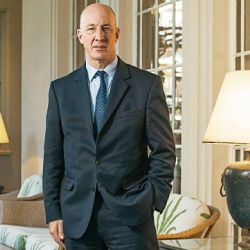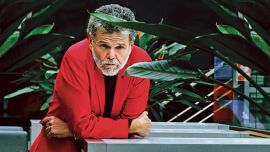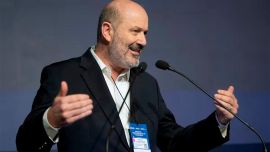In some ways, it’s easy to sum up British Ambassador to Argentina Mark Kent – you just need to do it in Spanish: “Buena onda” is the phrase that comes to mind.
Kent, 55, has been storming success for the Foreign Office in a role that many diplomats may have shied away from. He has taken it all in his stride, and always with a smile.
From charming citizens on social networks (and in-person at asados – more on that later) to aiding historic humanitarian efforts, the University of Oxford graduate has excelled in his post while breaking new ground in the very modern art of digital diplomacy.
But now, his watch is over. Next Wednesday – “if the plane departs,” he smiles – Britain’s beloved envoy to Argentina will depart these shores and head back home for a well-deserved break.
Kent remains unclear as to what lies ahead (“Nothing fixed,” he tells the Times). He says he and his wife are looking forward to being closer to their children after so long apart. He has a few days in the sun lined up too, after a whirlwind few final months.
“They say the two most stressful things are moving house and changing job,” he laughs. “And I’m doing both of them at the same time!”
Mark. by all accounts your time here has been a great success, a masterclass in diplomacy. How are you feeling now as your time wraps up? What does Argentina mean to you as you prepare to depart these fair shores?
A good question... Obviously I’m sad to leave Argentina because it’s been a lovely experience. I’ve spent five years of my life here, so professionally and personally it’s been very important to me, it’s been the longest time I’ve spent in any posting and as my third as ambassador. It’s been the most memorable in terms of the variety of things that have happened, we’ve been through a lot.
But I leave feeling like I’ve done everything I could and everything I wanted to and I’ve worked with a great team, not just in the [British] Embassy but more widely.
We’ve done some things that I will remember, and hopefully others will remember – the effort on the humanitarian project [regarding the identification of unmarked graves of Argentine soldiers on the Malvinas/Falkland Islands], the first visit of a British prime minister to Buenos Aires, we’ve done a lot of work on outreach and opening up the Embassy to the public, physically when we could before the pandemic, but also virtually, in terms of our communications.
What would be your proudest moment? The humanitarian effort with the Argentine and British governments and the Islanders?
I think it is, yes. You can do a lot of work which is about policy or government-to-government work that can be important, but the humanitarian effort probably because of the effect it had for those people who had been waiting such a long time [to learn the final resting place of their relatives].
They could have been any nationality. It’s one of those things that is there and you have to try and do something that is important and separate out that humanitarian work from any kind of political aspect, where we obviously have our differences, and you have to work to make that happen.
That was probably one of my proudest moments – the way everyone, no matter where they were from, worked to make this happen. Because it wasn’t just politically sensitive, it was logistically very challenging – so the government of Argentina, the British government, the islanders, the families commission, Eduardo Eurnekian and all the support he gave from Corporación América, the Red Cross – a whole range of people who said, ‘Look, this is a challenge but we’re going to put this aside and make it happen.’
I think it’s probably the most important thing we did, but I was just a small part of it.
Do you think these types of activities change the view of the British here in Argentina? From the outside, this job looks like a really tough one to walk into, and I think things like this help to break down barriers. Do you agree with that?
I think I would agree with that to a large extent. It’s about showing that we may be different nationalities and we may have different policies on certain things, but actually it’s all about sharing that we have common values as well. It’s a humanitarian story, but it’s also a human story.
Is that type of approach reflected in the support the Embassy gave regarding AstraZeneca and the vaccines here in Argentina?
The fact that AstraZeneca are producing here is work from their side and the University of Oxford, together with the private sector here in Argentina – that’s not the British government that’s done that. But I think it shows the general thread of the moment with this pandemic, which is a threat to the whole world regardless of borders and frontiers and politics.
AstraZeneca decided to manufacture the vaccine here because the technical conditions were there, it gave them the prospect of manufacturing the most [doses] the most efficiently and quickly.
At the moment of the global pandemic, it shows everyone working together and one thing that is clear is that you can’t have one country trying to go it alone or competition if we’re going to get out of this, otherwise we’ll just keep having repeated new strains.
It seems like you’ve faced a number of challenges here during your time – Brexit, a change of prime minister in Britain, Theresa May visiting, a G20 Leaders Summit, the change of government here – What kind of challenges do these events bring?
It’s normal in the current situation that there’s a lot of volatility outside in the world – from the pandemic to climate change to various other factors. As a diplomat, you’re there to represent your country and your government of the day and to explain back to headquarters what’s going on.
There have been a lot of changes, but those changes have been normal – in a democracy, you have elections and you have changes of governments. We look to engage with the government of the day – we have the G20 and the G20 Presidency and that was good as it brought a lot of British ministers to Argentina so they could get to know the country, including the current prime minister [Boris Johnson] who came out when he was foreign secretary.
We’ve had Brexit, which has been a source of change but also of opportunity, explaining how that might affect our relationships, what are the possibilities for future trade with Argentina and we’ve got the pandemic too – the world at the moment is volatile and we have to look for the opportunities in that, because they are there. Science and technology, our collaboration there with Argentina is an area with huge potential.
The two nations seem aligned on diversity too, on LGBT rights etc.
Yes, we are. Talking about common values, at the moment we are co-chairing the Equal Rights Coalition, which is an international organisation created to defend LGBT rights and we’re co-chairing that with Argentina until next year – that’s another area we can show we have a common agenda.
And with regards to the change in government here, from the Macri government to the Fernandez administration, which now seems much more focused on the islands... how is the relationship with the government now, a year-and-a-half into the Alberto Fernández administration?
I think the relationship is good. Just about as soon as the current government [in Argentina] took office the pandemic hit, which is a huge challenge for all governments and the priority has been dealing with that. We’ve developed a good relationship with the current Health Minister Carla Vizzotti and we’ve been having regular meetings to discuss the handling of the pandemic, exchanging experiences about vaccination campaigns, putting scientific research institutes in touch with each other to discuss new ways of handling the pandemic – that’s been the focus of our collaboration.
As you would expect, in any country, our focus is on dealing with the pandemic and climate change, which is a big global challenge and we have the [COP26] summit in Glasgow this year.
You mentioned the Islands, I think everybody’s positions are clear and well understood, they don’t change, but we’ve been able to look for collaboration in some areas, like the humanitarian work.
We’re looking, this week, in our edition, at Venezuela. Now, I would say that your approach to diplomacy is very outgoing, it’s always about dialogue, both online and in-person, whatever the issue. Regarding issues with such strong points of contention, is dialogue the only way out of crisis?
I think you have to understand everyone’s respective positions. And so, for me, contact is generally better than no contact.
I think as well we have a long in common with Argentina on human rights and in any country, you have to respect the sovereign decision of the government. It’s not for us to comment on every decision or vote from Argentina, they will come to their own position, but we have made it clear that we are here to collaborate in forums to strengthen human rights.
There’s a lot of talk in diplomatic circles nowadays about digital diplomacy and what that can bring and how it can change the perception people have of embassies, as stuffy institutions etc. You’ve clearly countered that narrative a lot. Did you identify that as a tool for reaching out to people?
I think generally diplomacy has changed quite a lot during the course of my career. When I first started, we didn’t have fax machines, we didn’t even have word processors – it was in a way a lot simpler, less actors.
What we’ve seen is two factors: one of them is acceleration, because now everything is so quick – now it’s one email, it used to be a few weeks for the diplomatic bag to arrive… you can have video conferences. Everything is more immediate. The other is what I’d call an atomisation, so where as before diplomacy was basically done between foreign ministers and embassies, now there are a lot more players – from NGOs and international organisations, to big multinationals… what has come more recently is involvement of citizens, and social media has really opened up a whole new spectrum where you can speak directly to a whole range of people without geography coming into it.
My Foreign Ministry and most foreign ministries recognise that this is an opportunity and also a place where people expect you to be – people want to know what their representatives are doing and also their diplomats in general. The fact that here in Argentina a number of embassies and ambassadors are active on social media is good. Elected representatives can appear distant and transparent and I think apart from using social media to explain what the UK is doing and what the UK is about and why you should visit, it’s also about explaining what ambassadors do.
I would never have known before I joined the Foreign Service what an ambassador did – it’s a chance to tell that story and have that point of contact, to open up a whole new range of possibilities. Obviously, you don’t exist only on social media, but it’s part of your tool-kit.
Do you think it empowers ambassadors? Traditionally, messaging was quite tightly controlled, but that isn’t possible with social media.
In that respect, it’s not really different from actually what you were doing before. If I have a meeting, no-one’s going to control every word I say! But at the same time, on social media, you know what your government’s policy is and you will reflect that.
Yes, but you’ve really done well in terms of humanising you and your work. I mean, you’ve answered tweets and gone to the houses of completely random people after they invited you to an asado!
(Laughs) That’s one of the fun things, the nice things about social media, anyone can get in touch with you. And yes, people have said ‘I’m having an asado, do you wanna come round?’
Yes, but it’s one thing to read the message and be polite and quite another to say yes and go!
It’s nice to meet new people! It’s good fun. Everyone has been so welcoming – that’s something about Argentina, people genuinely open up their house to you and invite you round and that’s something I will remember, the warm nature of the Argentine people.
QUICKFIRE QUESTIONS: WITH MARK KENT
A diplomat, logically, has to be diplomatic, but in the land of la grieta, that can’t always come to pass. And so, the Times took one final chance to grill the ambassador and acquire answers on a number of pressing issues of national importance. Here are Kent’s quickfire questions:
Invierno inglés or verano argentino?
Verano argentino. I’m Team Summer.
Sandwiches de miga o churros?
Sandwiches de miga.
Queen Elizabeth or Queen the band?
Hmm… Queen Elizabeth.
You’re going to get in trouble if you don’t say that, right?
(Laughs)
Peaky Blinders or Downton Abbey?
Peaky Blinders.
Notting Hill or Love Actually?
Oooo… Notting Hill.
English Breakfast or Earl Grey?
Green tea.
Mate: con o sin azúcar?
Sin azúcar.
Empanadas o choripán?
Empanadas.
That is the wrong answer! I may change that one… lomo o tira de asado?
Lomo.
Medialunas o facturas?
Neither.
I think we all know the answer to the next one. Whisky or wine?
Whisky.
Has to be.
Well, and wine as well.
Excellent. Dinner at 7pm or dinner at 9pm?
Dinner at 8.
Subte o bondi?
Depende.
Platea o popular?
I tend to get invited, so it tends to be platea...
James Corden or Marcelo Tinelli?
James Corden.
Susana or Mirtha?
Both!
I’m not sure you’ll answer the next four, but I’ll try anyway… Maradona or Messi?
Impossible to choose!
Beatles or Rolling Stones?
Err… more Beatles than Stones.
River or Boca?
(Pause) The United Nations!
Very good answer… Scotland or Wales?
(Laughs) The United Kingdom!
And finally… Tottenham Hotspur win the title or Arsenal get relegated?
That’s a trick question, they’re both among my worst nightmares!
























Comments